Leadership and Management in Operations: Unilever's Unit 4 Report
VerifiedAdded on 2020/12/18
|13
|4136
|82
Report
AI Summary
This report provides a comprehensive analysis of management and operation within Unilever, a multinational consumer goods company. It delves into the distinct roles and characteristics of leaders and managers, contrasting their responsibilities and functions in various situational contexts, such as launching new products and implementing new policies. The report explores diverse leadership theories, including situational leadership, system leadership, and contingency theory, evaluating their advantages and disadvantages. Furthermore, it examines key approaches to operational management, such as lean production, emphasizing their importance in achieving business goals and enhancing resource utilization. The impact of operational management on decision-making processes is also discussed. The assignment highlights the importance of effective leadership and management in driving organizational success and achieving desired outcomes within a dynamic business environment.
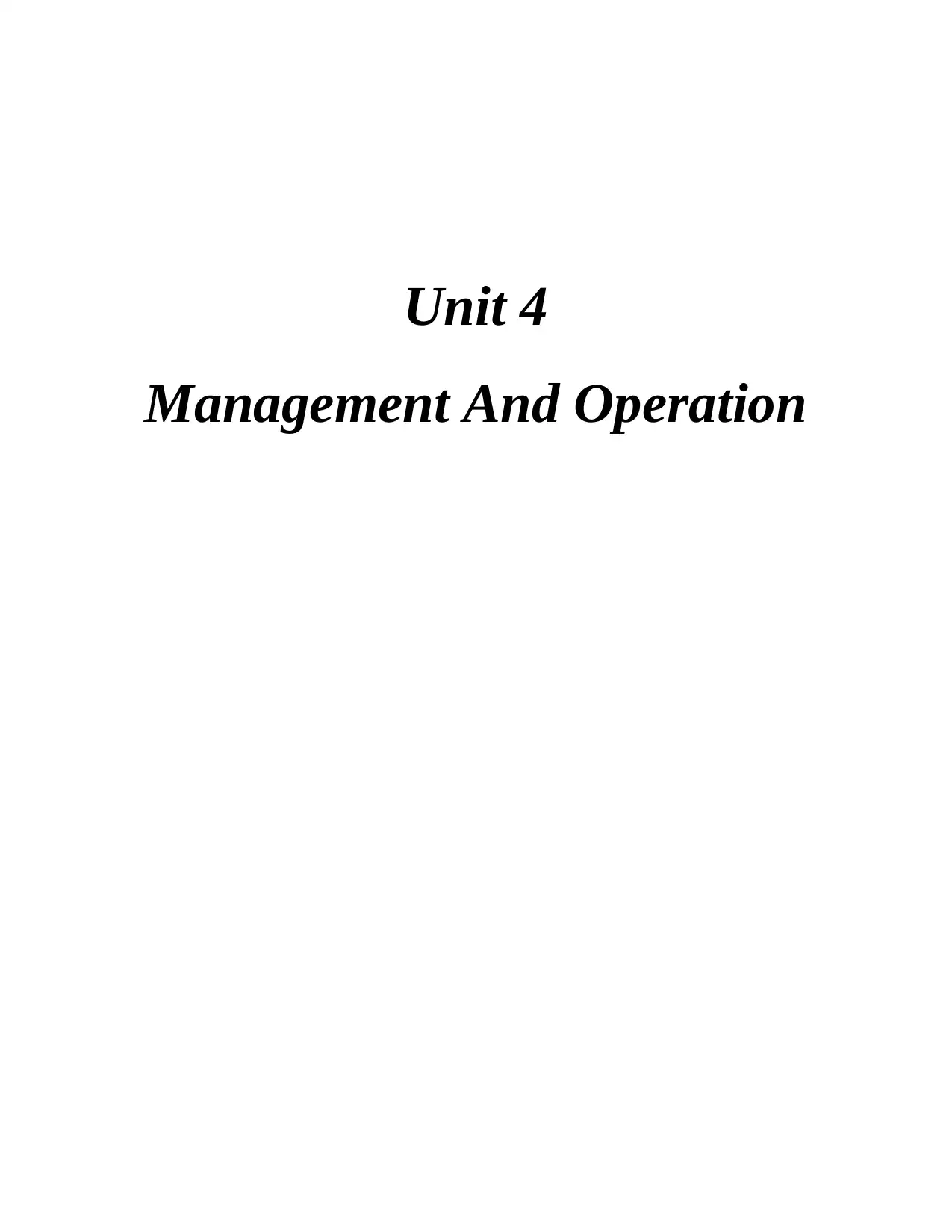
Unit 4
Management And Operation
Management And Operation
Paraphrase This Document
Need a fresh take? Get an instant paraphrase of this document with our AI Paraphraser
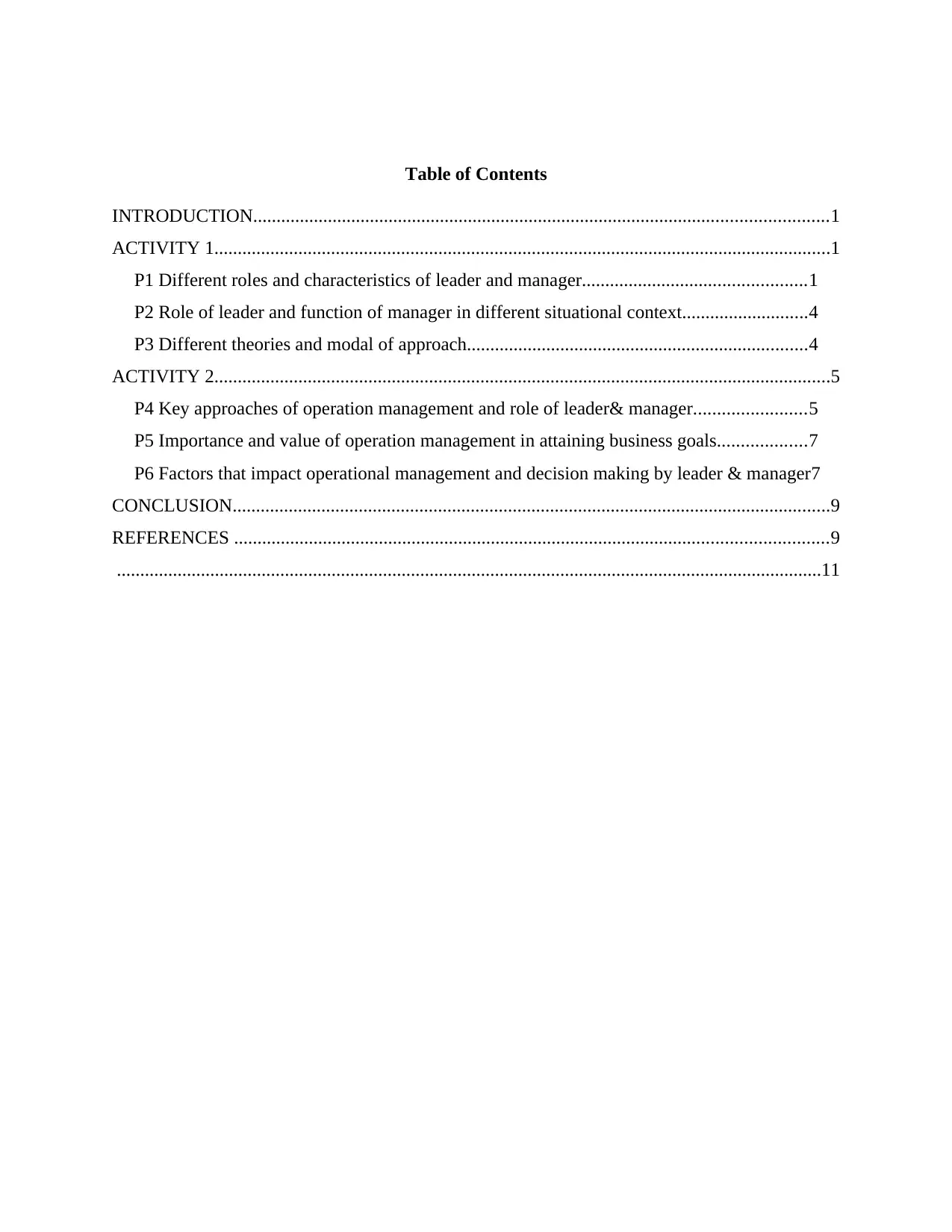
Table of Contents
INTRODUCTION...........................................................................................................................1
ACTIVITY 1....................................................................................................................................1
P1 Different roles and characteristics of leader and manager................................................1
P2 Role of leader and function of manager in different situational context...........................4
P3 Different theories and modal of approach.........................................................................4
ACTIVITY 2....................................................................................................................................5
P4 Key approaches of operation management and role of leader& manager........................5
P5 Importance and value of operation management in attaining business goals...................7
P6 Factors that impact operational management and decision making by leader & manager7
CONCLUSION................................................................................................................................9
REFERENCES ...............................................................................................................................9
.......................................................................................................................................................11
INTRODUCTION...........................................................................................................................1
ACTIVITY 1....................................................................................................................................1
P1 Different roles and characteristics of leader and manager................................................1
P2 Role of leader and function of manager in different situational context...........................4
P3 Different theories and modal of approach.........................................................................4
ACTIVITY 2....................................................................................................................................5
P4 Key approaches of operation management and role of leader& manager........................5
P5 Importance and value of operation management in attaining business goals...................7
P6 Factors that impact operational management and decision making by leader & manager7
CONCLUSION................................................................................................................................9
REFERENCES ...............................................................................................................................9
.......................................................................................................................................................11
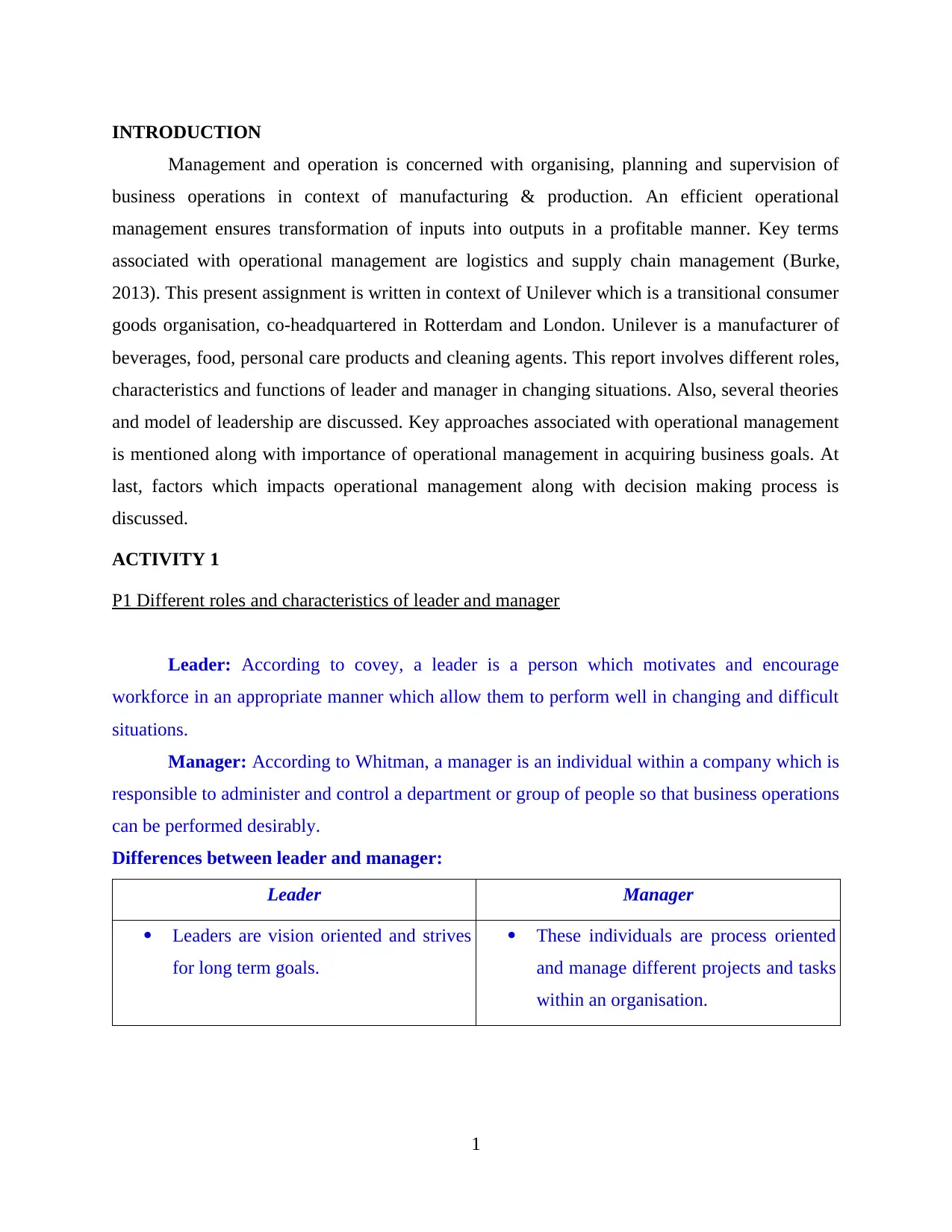
INTRODUCTION
Management and operation is concerned with organising, planning and supervision of
business operations in context of manufacturing & production. An efficient operational
management ensures transformation of inputs into outputs in a profitable manner. Key terms
associated with operational management are logistics and supply chain management (Burke,
2013). This present assignment is written in context of Unilever which is a transitional consumer
goods organisation, co-headquartered in Rotterdam and London. Unilever is a manufacturer of
beverages, food, personal care products and cleaning agents. This report involves different roles,
characteristics and functions of leader and manager in changing situations. Also, several theories
and model of leadership are discussed. Key approaches associated with operational management
is mentioned along with importance of operational management in acquiring business goals. At
last, factors which impacts operational management along with decision making process is
discussed.
ACTIVITY 1
P1 Different roles and characteristics of leader and manager
Leader: According to covey, a leader is a person which motivates and encourage
workforce in an appropriate manner which allow them to perform well in changing and difficult
situations.
Manager: According to Whitman, a manager is an individual within a company which is
responsible to administer and control a department or group of people so that business operations
can be performed desirably.
Differences between leader and manager:
Leader Manager
Leaders are vision oriented and strives
for long term goals.
These individuals are process oriented
and manage different projects and tasks
within an organisation.
1
Management and operation is concerned with organising, planning and supervision of
business operations in context of manufacturing & production. An efficient operational
management ensures transformation of inputs into outputs in a profitable manner. Key terms
associated with operational management are logistics and supply chain management (Burke,
2013). This present assignment is written in context of Unilever which is a transitional consumer
goods organisation, co-headquartered in Rotterdam and London. Unilever is a manufacturer of
beverages, food, personal care products and cleaning agents. This report involves different roles,
characteristics and functions of leader and manager in changing situations. Also, several theories
and model of leadership are discussed. Key approaches associated with operational management
is mentioned along with importance of operational management in acquiring business goals. At
last, factors which impacts operational management along with decision making process is
discussed.
ACTIVITY 1
P1 Different roles and characteristics of leader and manager
Leader: According to covey, a leader is a person which motivates and encourage
workforce in an appropriate manner which allow them to perform well in changing and difficult
situations.
Manager: According to Whitman, a manager is an individual within a company which is
responsible to administer and control a department or group of people so that business operations
can be performed desirably.
Differences between leader and manager:
Leader Manager
Leaders are vision oriented and strives
for long term goals.
These individuals are process oriented
and manage different projects and tasks
within an organisation.
1
⊘ This is a preview!⊘
Do you want full access?
Subscribe today to unlock all pages.

Trusted by 1+ million students worldwide
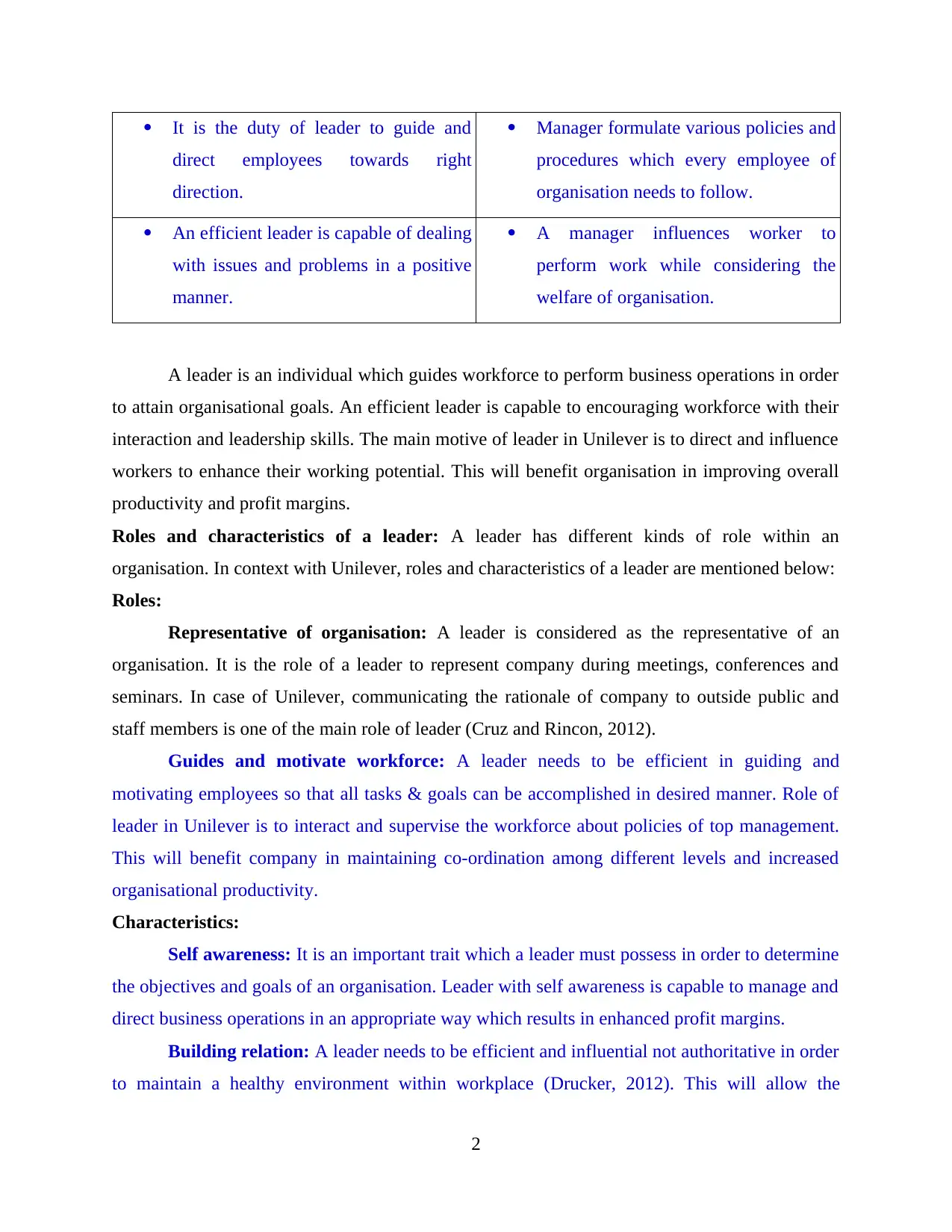
It is the duty of leader to guide and
direct employees towards right
direction.
Manager formulate various policies and
procedures which every employee of
organisation needs to follow.
An efficient leader is capable of dealing
with issues and problems in a positive
manner.
A manager influences worker to
perform work while considering the
welfare of organisation.
A leader is an individual which guides workforce to perform business operations in order
to attain organisational goals. An efficient leader is capable to encouraging workforce with their
interaction and leadership skills. The main motive of leader in Unilever is to direct and influence
workers to enhance their working potential. This will benefit organisation in improving overall
productivity and profit margins.
Roles and characteristics of a leader: A leader has different kinds of role within an
organisation. In context with Unilever, roles and characteristics of a leader are mentioned below:
Roles:
Representative of organisation: A leader is considered as the representative of an
organisation. It is the role of a leader to represent company during meetings, conferences and
seminars. In case of Unilever, communicating the rationale of company to outside public and
staff members is one of the main role of leader (Cruz and Rincon, 2012).
Guides and motivate workforce: A leader needs to be efficient in guiding and
motivating employees so that all tasks & goals can be accomplished in desired manner. Role of
leader in Unilever is to interact and supervise the workforce about policies of top management.
This will benefit company in maintaining co-ordination among different levels and increased
organisational productivity.
Characteristics:
Self awareness: It is an important trait which a leader must possess in order to determine
the objectives and goals of an organisation. Leader with self awareness is capable to manage and
direct business operations in an appropriate way which results in enhanced profit margins.
Building relation: A leader needs to be efficient and influential not authoritative in order
to maintain a healthy environment within workplace (Drucker, 2012). This will allow the
2
direct employees towards right
direction.
Manager formulate various policies and
procedures which every employee of
organisation needs to follow.
An efficient leader is capable of dealing
with issues and problems in a positive
manner.
A manager influences worker to
perform work while considering the
welfare of organisation.
A leader is an individual which guides workforce to perform business operations in order
to attain organisational goals. An efficient leader is capable to encouraging workforce with their
interaction and leadership skills. The main motive of leader in Unilever is to direct and influence
workers to enhance their working potential. This will benefit organisation in improving overall
productivity and profit margins.
Roles and characteristics of a leader: A leader has different kinds of role within an
organisation. In context with Unilever, roles and characteristics of a leader are mentioned below:
Roles:
Representative of organisation: A leader is considered as the representative of an
organisation. It is the role of a leader to represent company during meetings, conferences and
seminars. In case of Unilever, communicating the rationale of company to outside public and
staff members is one of the main role of leader (Cruz and Rincon, 2012).
Guides and motivate workforce: A leader needs to be efficient in guiding and
motivating employees so that all tasks & goals can be accomplished in desired manner. Role of
leader in Unilever is to interact and supervise the workforce about policies of top management.
This will benefit company in maintaining co-ordination among different levels and increased
organisational productivity.
Characteristics:
Self awareness: It is an important trait which a leader must possess in order to determine
the objectives and goals of an organisation. Leader with self awareness is capable to manage and
direct business operations in an appropriate way which results in enhanced profit margins.
Building relation: A leader needs to be efficient and influential not authoritative in order
to maintain a healthy environment within workplace (Drucker, 2012). This will allow the
2
Paraphrase This Document
Need a fresh take? Get an instant paraphrase of this document with our AI Paraphraser
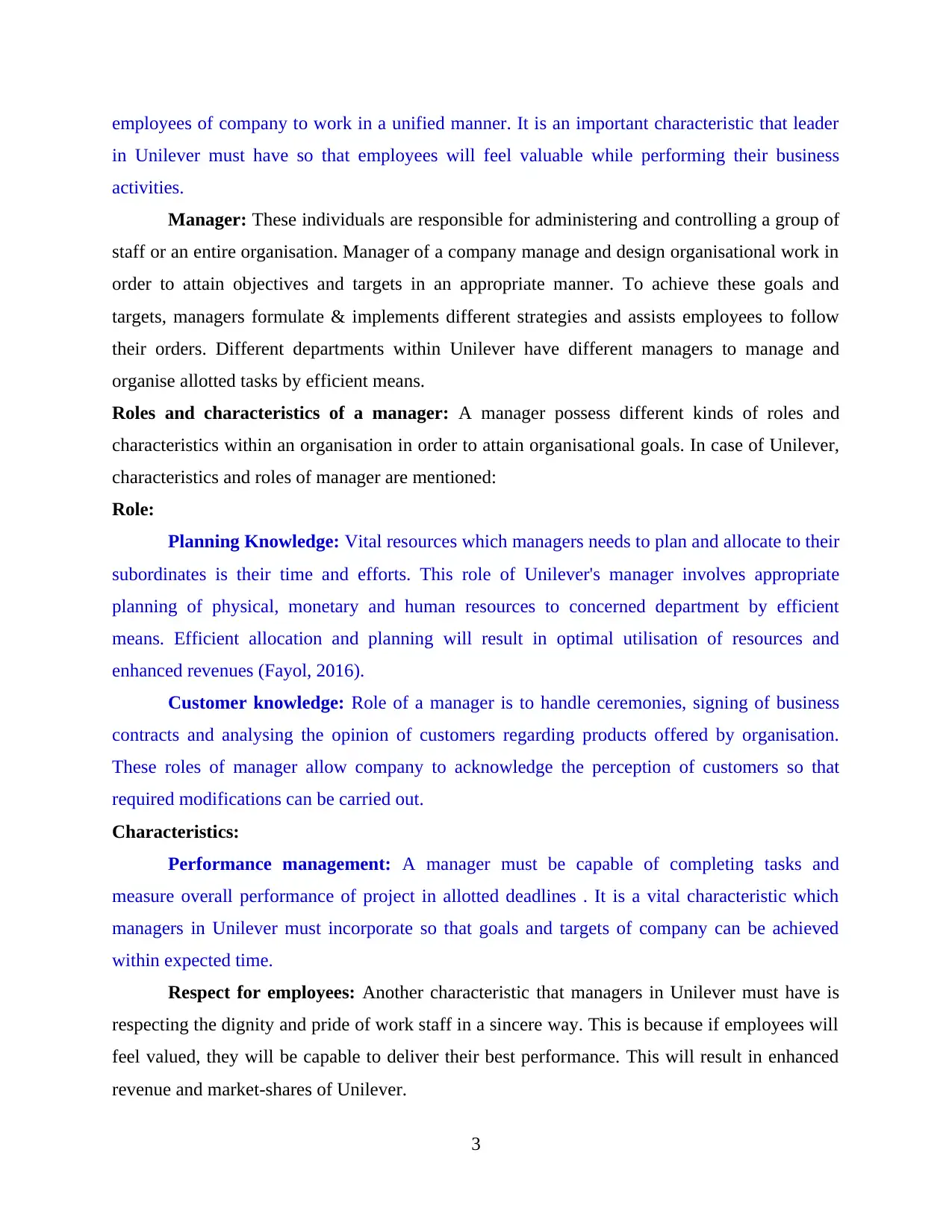
employees of company to work in a unified manner. It is an important characteristic that leader
in Unilever must have so that employees will feel valuable while performing their business
activities.
Manager: These individuals are responsible for administering and controlling a group of
staff or an entire organisation. Manager of a company manage and design organisational work in
order to attain objectives and targets in an appropriate manner. To achieve these goals and
targets, managers formulate & implements different strategies and assists employees to follow
their orders. Different departments within Unilever have different managers to manage and
organise allotted tasks by efficient means.
Roles and characteristics of a manager: A manager possess different kinds of roles and
characteristics within an organisation in order to attain organisational goals. In case of Unilever,
characteristics and roles of manager are mentioned:
Role:
Planning Knowledge: Vital resources which managers needs to plan and allocate to their
subordinates is their time and efforts. This role of Unilever's manager involves appropriate
planning of physical, monetary and human resources to concerned department by efficient
means. Efficient allocation and planning will result in optimal utilisation of resources and
enhanced revenues (Fayol, 2016).
Customer knowledge: Role of a manager is to handle ceremonies, signing of business
contracts and analysing the opinion of customers regarding products offered by organisation.
These roles of manager allow company to acknowledge the perception of customers so that
required modifications can be carried out.
Characteristics:
Performance management: A manager must be capable of completing tasks and
measure overall performance of project in allotted deadlines . It is a vital characteristic which
managers in Unilever must incorporate so that goals and targets of company can be achieved
within expected time.
Respect for employees: Another characteristic that managers in Unilever must have is
respecting the dignity and pride of work staff in a sincere way. This is because if employees will
feel valued, they will be capable to deliver their best performance. This will result in enhanced
revenue and market-shares of Unilever.
3
in Unilever must have so that employees will feel valuable while performing their business
activities.
Manager: These individuals are responsible for administering and controlling a group of
staff or an entire organisation. Manager of a company manage and design organisational work in
order to attain objectives and targets in an appropriate manner. To achieve these goals and
targets, managers formulate & implements different strategies and assists employees to follow
their orders. Different departments within Unilever have different managers to manage and
organise allotted tasks by efficient means.
Roles and characteristics of a manager: A manager possess different kinds of roles and
characteristics within an organisation in order to attain organisational goals. In case of Unilever,
characteristics and roles of manager are mentioned:
Role:
Planning Knowledge: Vital resources which managers needs to plan and allocate to their
subordinates is their time and efforts. This role of Unilever's manager involves appropriate
planning of physical, monetary and human resources to concerned department by efficient
means. Efficient allocation and planning will result in optimal utilisation of resources and
enhanced revenues (Fayol, 2016).
Customer knowledge: Role of a manager is to handle ceremonies, signing of business
contracts and analysing the opinion of customers regarding products offered by organisation.
These roles of manager allow company to acknowledge the perception of customers so that
required modifications can be carried out.
Characteristics:
Performance management: A manager must be capable of completing tasks and
measure overall performance of project in allotted deadlines . It is a vital characteristic which
managers in Unilever must incorporate so that goals and targets of company can be achieved
within expected time.
Respect for employees: Another characteristic that managers in Unilever must have is
respecting the dignity and pride of work staff in a sincere way. This is because if employees will
feel valued, they will be capable to deliver their best performance. This will result in enhanced
revenue and market-shares of Unilever.
3
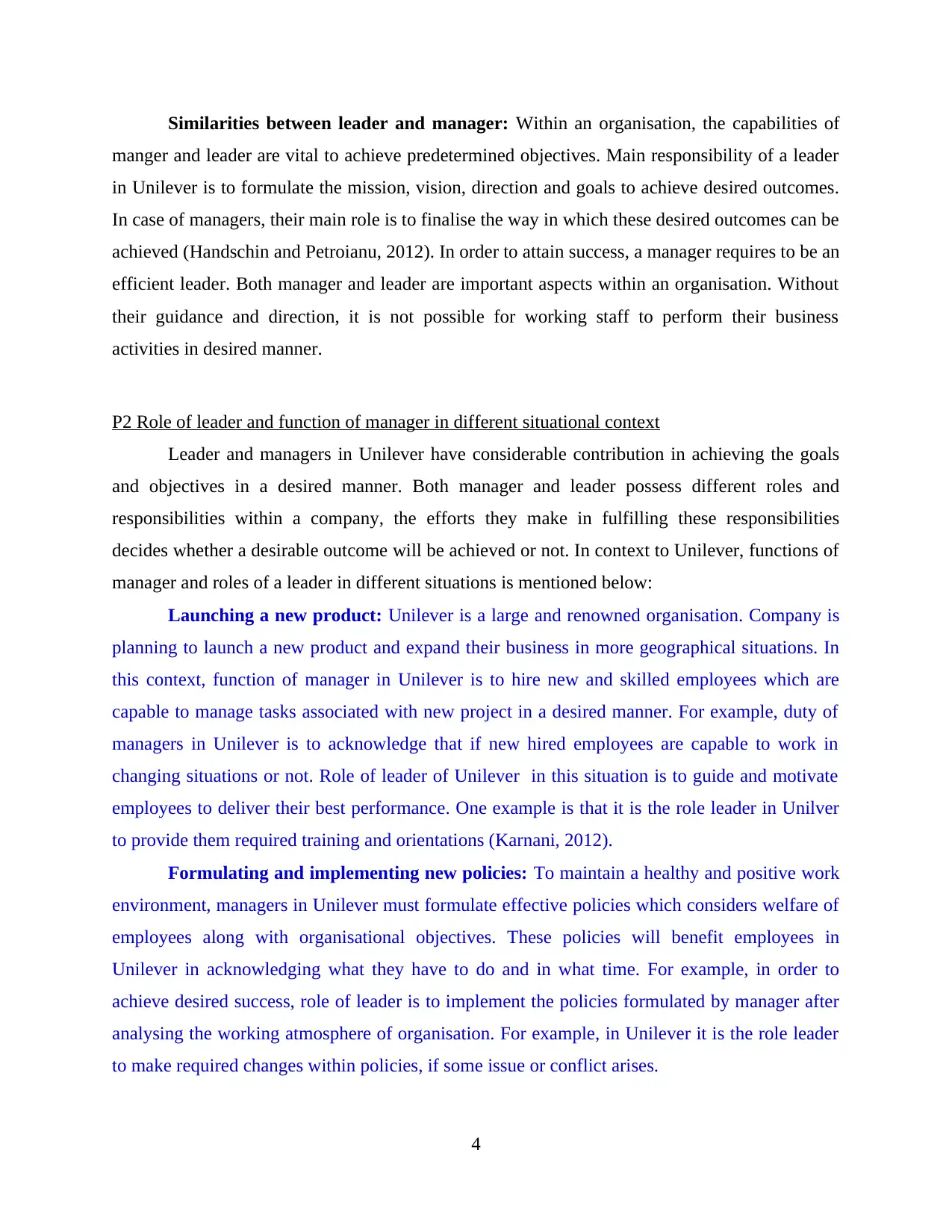
Similarities between leader and manager: Within an organisation, the capabilities of
manger and leader are vital to achieve predetermined objectives. Main responsibility of a leader
in Unilever is to formulate the mission, vision, direction and goals to achieve desired outcomes.
In case of managers, their main role is to finalise the way in which these desired outcomes can be
achieved (Handschin and Petroianu, 2012). In order to attain success, a manager requires to be an
efficient leader. Both manager and leader are important aspects within an organisation. Without
their guidance and direction, it is not possible for working staff to perform their business
activities in desired manner.
P2 Role of leader and function of manager in different situational context
Leader and managers in Unilever have considerable contribution in achieving the goals
and objectives in a desired manner. Both manager and leader possess different roles and
responsibilities within a company, the efforts they make in fulfilling these responsibilities
decides whether a desirable outcome will be achieved or not. In context to Unilever, functions of
manager and roles of a leader in different situations is mentioned below:
Launching a new product: Unilever is a large and renowned organisation. Company is
planning to launch a new product and expand their business in more geographical situations. In
this context, function of manager in Unilever is to hire new and skilled employees which are
capable to manage tasks associated with new project in a desired manner. For example, duty of
managers in Unilever is to acknowledge that if new hired employees are capable to work in
changing situations or not. Role of leader of Unilever in this situation is to guide and motivate
employees to deliver their best performance. One example is that it is the role leader in Unilver
to provide them required training and orientations (Karnani, 2012).
Formulating and implementing new policies: To maintain a healthy and positive work
environment, managers in Unilever must formulate effective policies which considers welfare of
employees along with organisational objectives. These policies will benefit employees in
Unilever in acknowledging what they have to do and in what time. For example, in order to
achieve desired success, role of leader is to implement the policies formulated by manager after
analysing the working atmosphere of organisation. For example, in Unilever it is the role leader
to make required changes within policies, if some issue or conflict arises.
4
manger and leader are vital to achieve predetermined objectives. Main responsibility of a leader
in Unilever is to formulate the mission, vision, direction and goals to achieve desired outcomes.
In case of managers, their main role is to finalise the way in which these desired outcomes can be
achieved (Handschin and Petroianu, 2012). In order to attain success, a manager requires to be an
efficient leader. Both manager and leader are important aspects within an organisation. Without
their guidance and direction, it is not possible for working staff to perform their business
activities in desired manner.
P2 Role of leader and function of manager in different situational context
Leader and managers in Unilever have considerable contribution in achieving the goals
and objectives in a desired manner. Both manager and leader possess different roles and
responsibilities within a company, the efforts they make in fulfilling these responsibilities
decides whether a desirable outcome will be achieved or not. In context to Unilever, functions of
manager and roles of a leader in different situations is mentioned below:
Launching a new product: Unilever is a large and renowned organisation. Company is
planning to launch a new product and expand their business in more geographical situations. In
this context, function of manager in Unilever is to hire new and skilled employees which are
capable to manage tasks associated with new project in a desired manner. For example, duty of
managers in Unilever is to acknowledge that if new hired employees are capable to work in
changing situations or not. Role of leader of Unilever in this situation is to guide and motivate
employees to deliver their best performance. One example is that it is the role leader in Unilver
to provide them required training and orientations (Karnani, 2012).
Formulating and implementing new policies: To maintain a healthy and positive work
environment, managers in Unilever must formulate effective policies which considers welfare of
employees along with organisational objectives. These policies will benefit employees in
Unilever in acknowledging what they have to do and in what time. For example, in order to
achieve desired success, role of leader is to implement the policies formulated by manager after
analysing the working atmosphere of organisation. For example, in Unilever it is the role leader
to make required changes within policies, if some issue or conflict arises.
4
⊘ This is a preview!⊘
Do you want full access?
Subscribe today to unlock all pages.

Trusted by 1+ million students worldwide
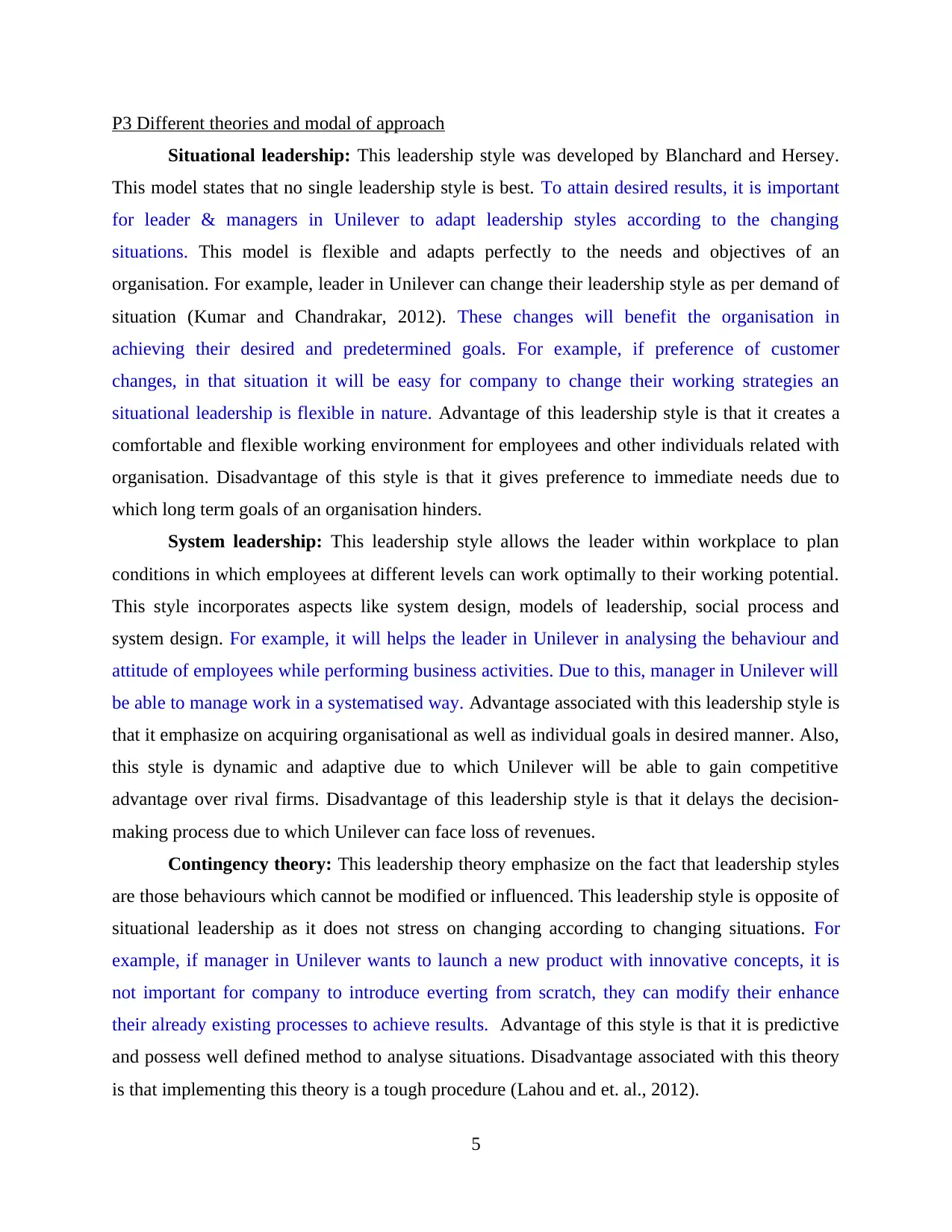
P3 Different theories and modal of approach
Situational leadership: This leadership style was developed by Blanchard and Hersey.
This model states that no single leadership style is best. To attain desired results, it is important
for leader & managers in Unilever to adapt leadership styles according to the changing
situations. This model is flexible and adapts perfectly to the needs and objectives of an
organisation. For example, leader in Unilever can change their leadership style as per demand of
situation (Kumar and Chandrakar, 2012). These changes will benefit the organisation in
achieving their desired and predetermined goals. For example, if preference of customer
changes, in that situation it will be easy for company to change their working strategies an
situational leadership is flexible in nature. Advantage of this leadership style is that it creates a
comfortable and flexible working environment for employees and other individuals related with
organisation. Disadvantage of this style is that it gives preference to immediate needs due to
which long term goals of an organisation hinders.
System leadership: This leadership style allows the leader within workplace to plan
conditions in which employees at different levels can work optimally to their working potential.
This style incorporates aspects like system design, models of leadership, social process and
system design. For example, it will helps the leader in Unilever in analysing the behaviour and
attitude of employees while performing business activities. Due to this, manager in Unilever will
be able to manage work in a systematised way. Advantage associated with this leadership style is
that it emphasize on acquiring organisational as well as individual goals in desired manner. Also,
this style is dynamic and adaptive due to which Unilever will be able to gain competitive
advantage over rival firms. Disadvantage of this leadership style is that it delays the decision-
making process due to which Unilever can face loss of revenues.
Contingency theory: This leadership theory emphasize on the fact that leadership styles
are those behaviours which cannot be modified or influenced. This leadership style is opposite of
situational leadership as it does not stress on changing according to changing situations. For
example, if manager in Unilever wants to launch a new product with innovative concepts, it is
not important for company to introduce everting from scratch, they can modify their enhance
their already existing processes to achieve results. Advantage of this style is that it is predictive
and possess well defined method to analyse situations. Disadvantage associated with this theory
is that implementing this theory is a tough procedure (Lahou and et. al., 2012).
5
Situational leadership: This leadership style was developed by Blanchard and Hersey.
This model states that no single leadership style is best. To attain desired results, it is important
for leader & managers in Unilever to adapt leadership styles according to the changing
situations. This model is flexible and adapts perfectly to the needs and objectives of an
organisation. For example, leader in Unilever can change their leadership style as per demand of
situation (Kumar and Chandrakar, 2012). These changes will benefit the organisation in
achieving their desired and predetermined goals. For example, if preference of customer
changes, in that situation it will be easy for company to change their working strategies an
situational leadership is flexible in nature. Advantage of this leadership style is that it creates a
comfortable and flexible working environment for employees and other individuals related with
organisation. Disadvantage of this style is that it gives preference to immediate needs due to
which long term goals of an organisation hinders.
System leadership: This leadership style allows the leader within workplace to plan
conditions in which employees at different levels can work optimally to their working potential.
This style incorporates aspects like system design, models of leadership, social process and
system design. For example, it will helps the leader in Unilever in analysing the behaviour and
attitude of employees while performing business activities. Due to this, manager in Unilever will
be able to manage work in a systematised way. Advantage associated with this leadership style is
that it emphasize on acquiring organisational as well as individual goals in desired manner. Also,
this style is dynamic and adaptive due to which Unilever will be able to gain competitive
advantage over rival firms. Disadvantage of this leadership style is that it delays the decision-
making process due to which Unilever can face loss of revenues.
Contingency theory: This leadership theory emphasize on the fact that leadership styles
are those behaviours which cannot be modified or influenced. This leadership style is opposite of
situational leadership as it does not stress on changing according to changing situations. For
example, if manager in Unilever wants to launch a new product with innovative concepts, it is
not important for company to introduce everting from scratch, they can modify their enhance
their already existing processes to achieve results. Advantage of this style is that it is predictive
and possess well defined method to analyse situations. Disadvantage associated with this theory
is that implementing this theory is a tough procedure (Lahou and et. al., 2012).
5
Paraphrase This Document
Need a fresh take? Get an instant paraphrase of this document with our AI Paraphraser
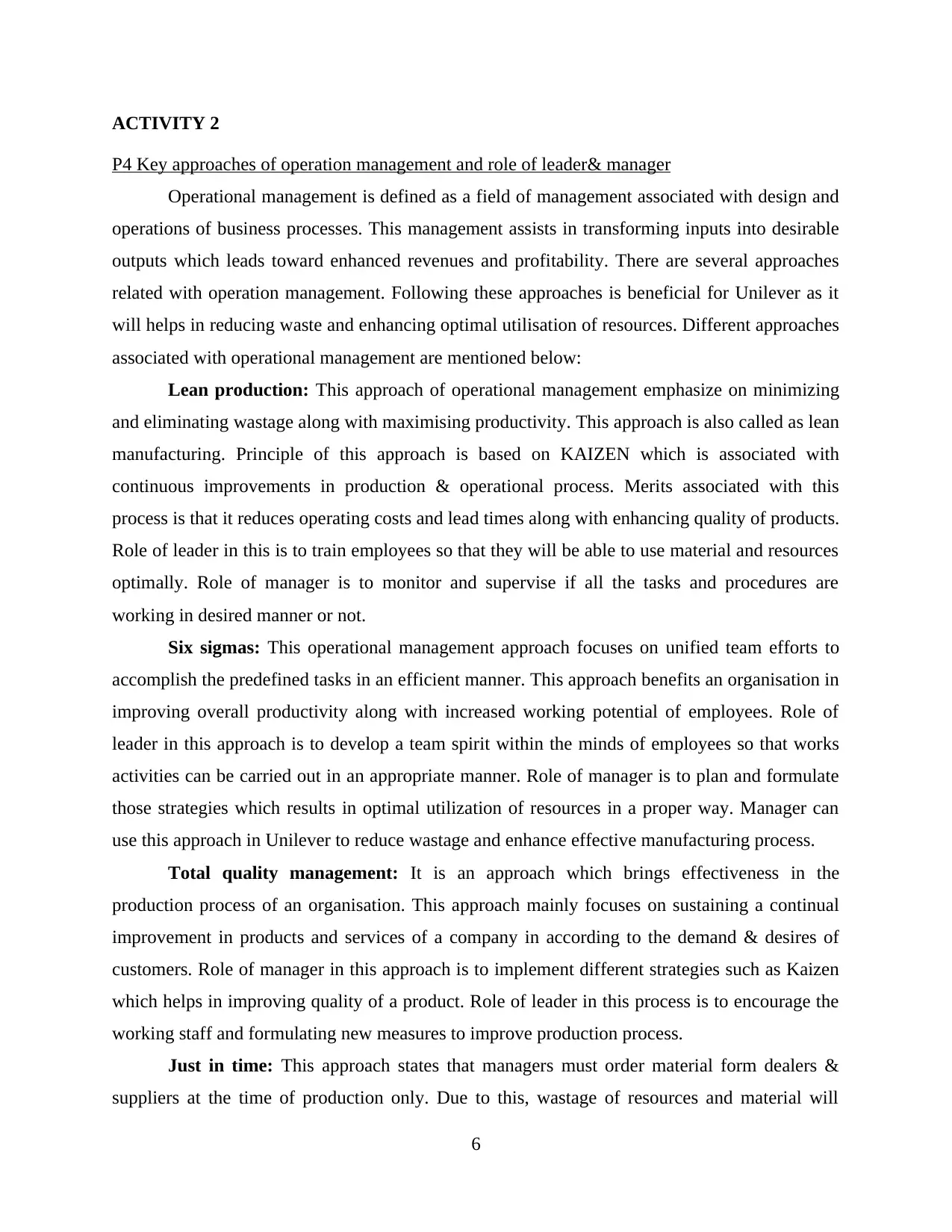
ACTIVITY 2
P4 Key approaches of operation management and role of leader& manager
Operational management is defined as a field of management associated with design and
operations of business processes. This management assists in transforming inputs into desirable
outputs which leads toward enhanced revenues and profitability. There are several approaches
related with operation management. Following these approaches is beneficial for Unilever as it
will helps in reducing waste and enhancing optimal utilisation of resources. Different approaches
associated with operational management are mentioned below:
Lean production: This approach of operational management emphasize on minimizing
and eliminating wastage along with maximising productivity. This approach is also called as lean
manufacturing. Principle of this approach is based on KAIZEN which is associated with
continuous improvements in production & operational process. Merits associated with this
process is that it reduces operating costs and lead times along with enhancing quality of products.
Role of leader in this is to train employees so that they will be able to use material and resources
optimally. Role of manager is to monitor and supervise if all the tasks and procedures are
working in desired manner or not.
Six sigmas: This operational management approach focuses on unified team efforts to
accomplish the predefined tasks in an efficient manner. This approach benefits an organisation in
improving overall productivity along with increased working potential of employees. Role of
leader in this approach is to develop a team spirit within the minds of employees so that works
activities can be carried out in an appropriate manner. Role of manager is to plan and formulate
those strategies which results in optimal utilization of resources in a proper way. Manager can
use this approach in Unilever to reduce wastage and enhance effective manufacturing process.
Total quality management: It is an approach which brings effectiveness in the
production process of an organisation. This approach mainly focuses on sustaining a continual
improvement in products and services of a company in according to the demand & desires of
customers. Role of manager in this approach is to implement different strategies such as Kaizen
which helps in improving quality of a product. Role of leader in this process is to encourage the
working staff and formulating new measures to improve production process.
Just in time: This approach states that managers must order material form dealers &
suppliers at the time of production only. Due to this, wastage of resources and material will
6
P4 Key approaches of operation management and role of leader& manager
Operational management is defined as a field of management associated with design and
operations of business processes. This management assists in transforming inputs into desirable
outputs which leads toward enhanced revenues and profitability. There are several approaches
related with operation management. Following these approaches is beneficial for Unilever as it
will helps in reducing waste and enhancing optimal utilisation of resources. Different approaches
associated with operational management are mentioned below:
Lean production: This approach of operational management emphasize on minimizing
and eliminating wastage along with maximising productivity. This approach is also called as lean
manufacturing. Principle of this approach is based on KAIZEN which is associated with
continuous improvements in production & operational process. Merits associated with this
process is that it reduces operating costs and lead times along with enhancing quality of products.
Role of leader in this is to train employees so that they will be able to use material and resources
optimally. Role of manager is to monitor and supervise if all the tasks and procedures are
working in desired manner or not.
Six sigmas: This operational management approach focuses on unified team efforts to
accomplish the predefined tasks in an efficient manner. This approach benefits an organisation in
improving overall productivity along with increased working potential of employees. Role of
leader in this approach is to develop a team spirit within the minds of employees so that works
activities can be carried out in an appropriate manner. Role of manager is to plan and formulate
those strategies which results in optimal utilization of resources in a proper way. Manager can
use this approach in Unilever to reduce wastage and enhance effective manufacturing process.
Total quality management: It is an approach which brings effectiveness in the
production process of an organisation. This approach mainly focuses on sustaining a continual
improvement in products and services of a company in according to the demand & desires of
customers. Role of manager in this approach is to implement different strategies such as Kaizen
which helps in improving quality of a product. Role of leader in this process is to encourage the
working staff and formulating new measures to improve production process.
Just in time: This approach states that managers must order material form dealers &
suppliers at the time of production only. Due to this, wastage of resources and material will
6
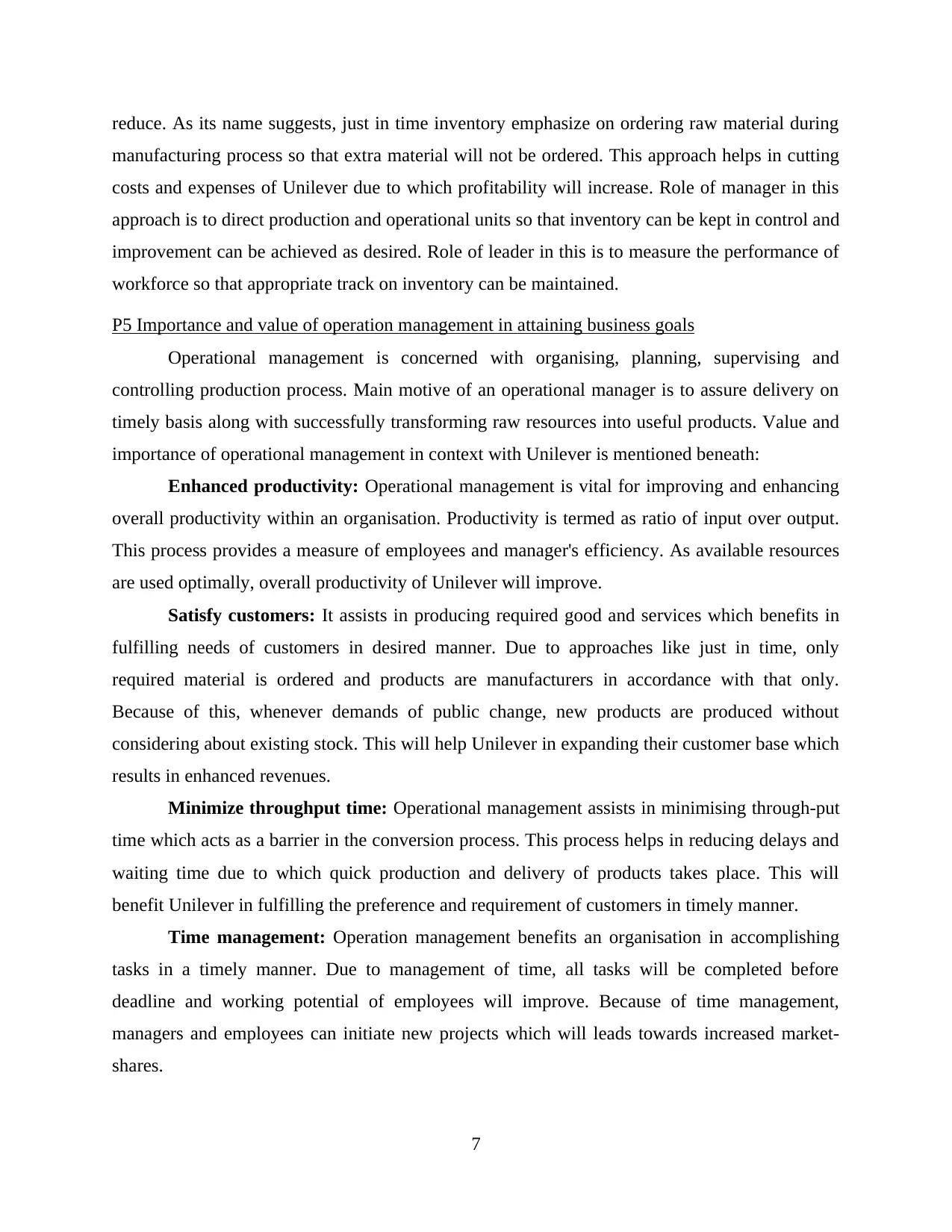
reduce. As its name suggests, just in time inventory emphasize on ordering raw material during
manufacturing process so that extra material will not be ordered. This approach helps in cutting
costs and expenses of Unilever due to which profitability will increase. Role of manager in this
approach is to direct production and operational units so that inventory can be kept in control and
improvement can be achieved as desired. Role of leader in this is to measure the performance of
workforce so that appropriate track on inventory can be maintained.
P5 Importance and value of operation management in attaining business goals
Operational management is concerned with organising, planning, supervising and
controlling production process. Main motive of an operational manager is to assure delivery on
timely basis along with successfully transforming raw resources into useful products. Value and
importance of operational management in context with Unilever is mentioned beneath:
Enhanced productivity: Operational management is vital for improving and enhancing
overall productivity within an organisation. Productivity is termed as ratio of input over output.
This process provides a measure of employees and manager's efficiency. As available resources
are used optimally, overall productivity of Unilever will improve.
Satisfy customers: It assists in producing required good and services which benefits in
fulfilling needs of customers in desired manner. Due to approaches like just in time, only
required material is ordered and products are manufacturers in accordance with that only.
Because of this, whenever demands of public change, new products are produced without
considering about existing stock. This will help Unilever in expanding their customer base which
results in enhanced revenues.
Minimize throughput time: Operational management assists in minimising through-put
time which acts as a barrier in the conversion process. This process helps in reducing delays and
waiting time due to which quick production and delivery of products takes place. This will
benefit Unilever in fulfilling the preference and requirement of customers in timely manner.
Time management: Operation management benefits an organisation in accomplishing
tasks in a timely manner. Due to management of time, all tasks will be completed before
deadline and working potential of employees will improve. Because of time management,
managers and employees can initiate new projects which will leads towards increased market-
shares.
7
manufacturing process so that extra material will not be ordered. This approach helps in cutting
costs and expenses of Unilever due to which profitability will increase. Role of manager in this
approach is to direct production and operational units so that inventory can be kept in control and
improvement can be achieved as desired. Role of leader in this is to measure the performance of
workforce so that appropriate track on inventory can be maintained.
P5 Importance and value of operation management in attaining business goals
Operational management is concerned with organising, planning, supervising and
controlling production process. Main motive of an operational manager is to assure delivery on
timely basis along with successfully transforming raw resources into useful products. Value and
importance of operational management in context with Unilever is mentioned beneath:
Enhanced productivity: Operational management is vital for improving and enhancing
overall productivity within an organisation. Productivity is termed as ratio of input over output.
This process provides a measure of employees and manager's efficiency. As available resources
are used optimally, overall productivity of Unilever will improve.
Satisfy customers: It assists in producing required good and services which benefits in
fulfilling needs of customers in desired manner. Due to approaches like just in time, only
required material is ordered and products are manufacturers in accordance with that only.
Because of this, whenever demands of public change, new products are produced without
considering about existing stock. This will help Unilever in expanding their customer base which
results in enhanced revenues.
Minimize throughput time: Operational management assists in minimising through-put
time which acts as a barrier in the conversion process. This process helps in reducing delays and
waiting time due to which quick production and delivery of products takes place. This will
benefit Unilever in fulfilling the preference and requirement of customers in timely manner.
Time management: Operation management benefits an organisation in accomplishing
tasks in a timely manner. Due to management of time, all tasks will be completed before
deadline and working potential of employees will improve. Because of time management,
managers and employees can initiate new projects which will leads towards increased market-
shares.
7
⊘ This is a preview!⊘
Do you want full access?
Subscribe today to unlock all pages.

Trusted by 1+ million students worldwide
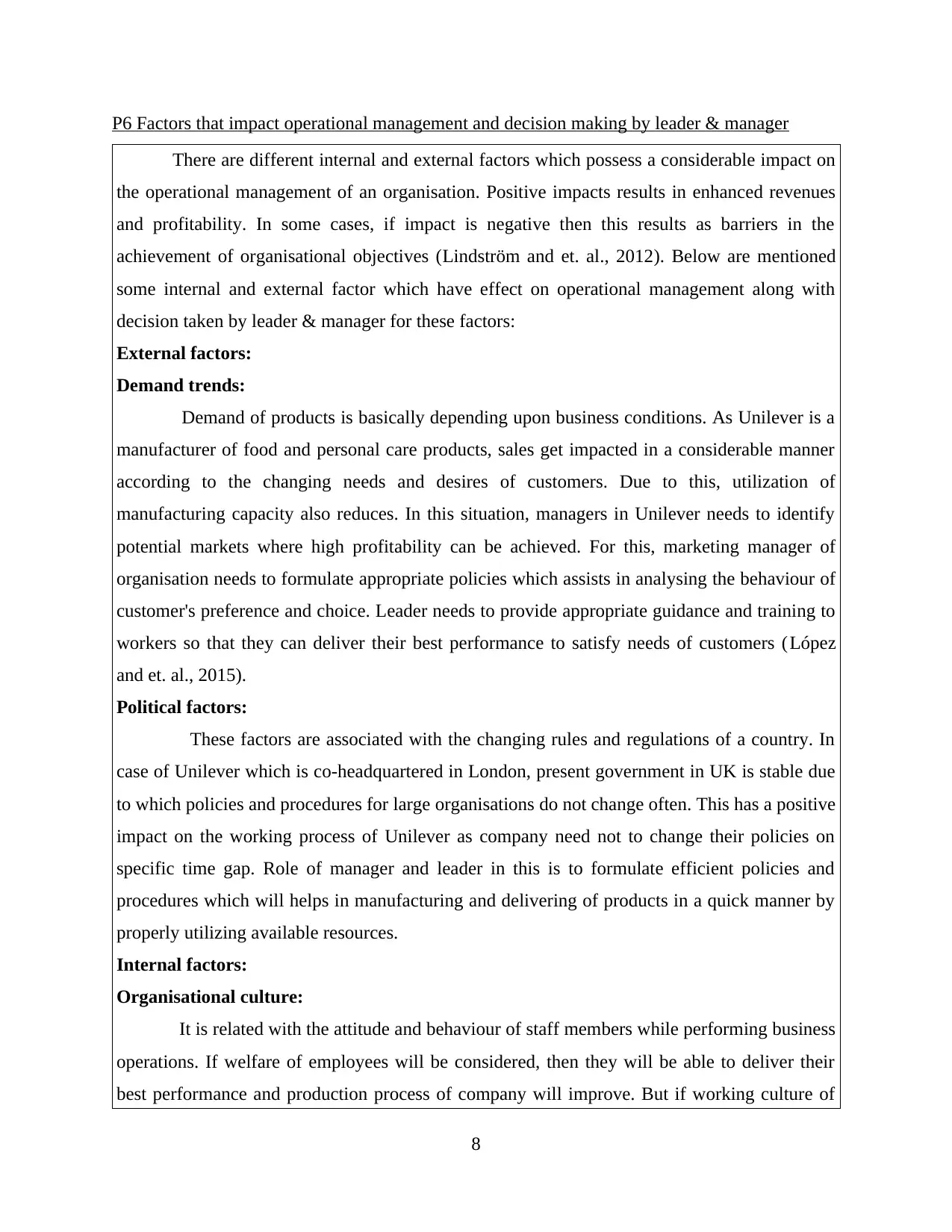
P6 Factors that impact operational management and decision making by leader & manager
There are different internal and external factors which possess a considerable impact on
the operational management of an organisation. Positive impacts results in enhanced revenues
and profitability. In some cases, if impact is negative then this results as barriers in the
achievement of organisational objectives (Lindström and et. al., 2012). Below are mentioned
some internal and external factor which have effect on operational management along with
decision taken by leader & manager for these factors:
External factors:
Demand trends:
Demand of products is basically depending upon business conditions. As Unilever is a
manufacturer of food and personal care products, sales get impacted in a considerable manner
according to the changing needs and desires of customers. Due to this, utilization of
manufacturing capacity also reduces. In this situation, managers in Unilever needs to identify
potential markets where high profitability can be achieved. For this, marketing manager of
organisation needs to formulate appropriate policies which assists in analysing the behaviour of
customer's preference and choice. Leader needs to provide appropriate guidance and training to
workers so that they can deliver their best performance to satisfy needs of customers (López
and et. al., 2015).
Political factors:
These factors are associated with the changing rules and regulations of a country. In
case of Unilever which is co-headquartered in London, present government in UK is stable due
to which policies and procedures for large organisations do not change often. This has a positive
impact on the working process of Unilever as company need not to change their policies on
specific time gap. Role of manager and leader in this is to formulate efficient policies and
procedures which will helps in manufacturing and delivering of products in a quick manner by
properly utilizing available resources.
Internal factors:
Organisational culture:
It is related with the attitude and behaviour of staff members while performing business
operations. If welfare of employees will be considered, then they will be able to deliver their
best performance and production process of company will improve. But if working culture of
8
There are different internal and external factors which possess a considerable impact on
the operational management of an organisation. Positive impacts results in enhanced revenues
and profitability. In some cases, if impact is negative then this results as barriers in the
achievement of organisational objectives (Lindström and et. al., 2012). Below are mentioned
some internal and external factor which have effect on operational management along with
decision taken by leader & manager for these factors:
External factors:
Demand trends:
Demand of products is basically depending upon business conditions. As Unilever is a
manufacturer of food and personal care products, sales get impacted in a considerable manner
according to the changing needs and desires of customers. Due to this, utilization of
manufacturing capacity also reduces. In this situation, managers in Unilever needs to identify
potential markets where high profitability can be achieved. For this, marketing manager of
organisation needs to formulate appropriate policies which assists in analysing the behaviour of
customer's preference and choice. Leader needs to provide appropriate guidance and training to
workers so that they can deliver their best performance to satisfy needs of customers (López
and et. al., 2015).
Political factors:
These factors are associated with the changing rules and regulations of a country. In
case of Unilever which is co-headquartered in London, present government in UK is stable due
to which policies and procedures for large organisations do not change often. This has a positive
impact on the working process of Unilever as company need not to change their policies on
specific time gap. Role of manager and leader in this is to formulate efficient policies and
procedures which will helps in manufacturing and delivering of products in a quick manner by
properly utilizing available resources.
Internal factors:
Organisational culture:
It is related with the attitude and behaviour of staff members while performing business
operations. If welfare of employees will be considered, then they will be able to deliver their
best performance and production process of company will improve. But if working culture of
8
Paraphrase This Document
Need a fresh take? Get an instant paraphrase of this document with our AI Paraphraser
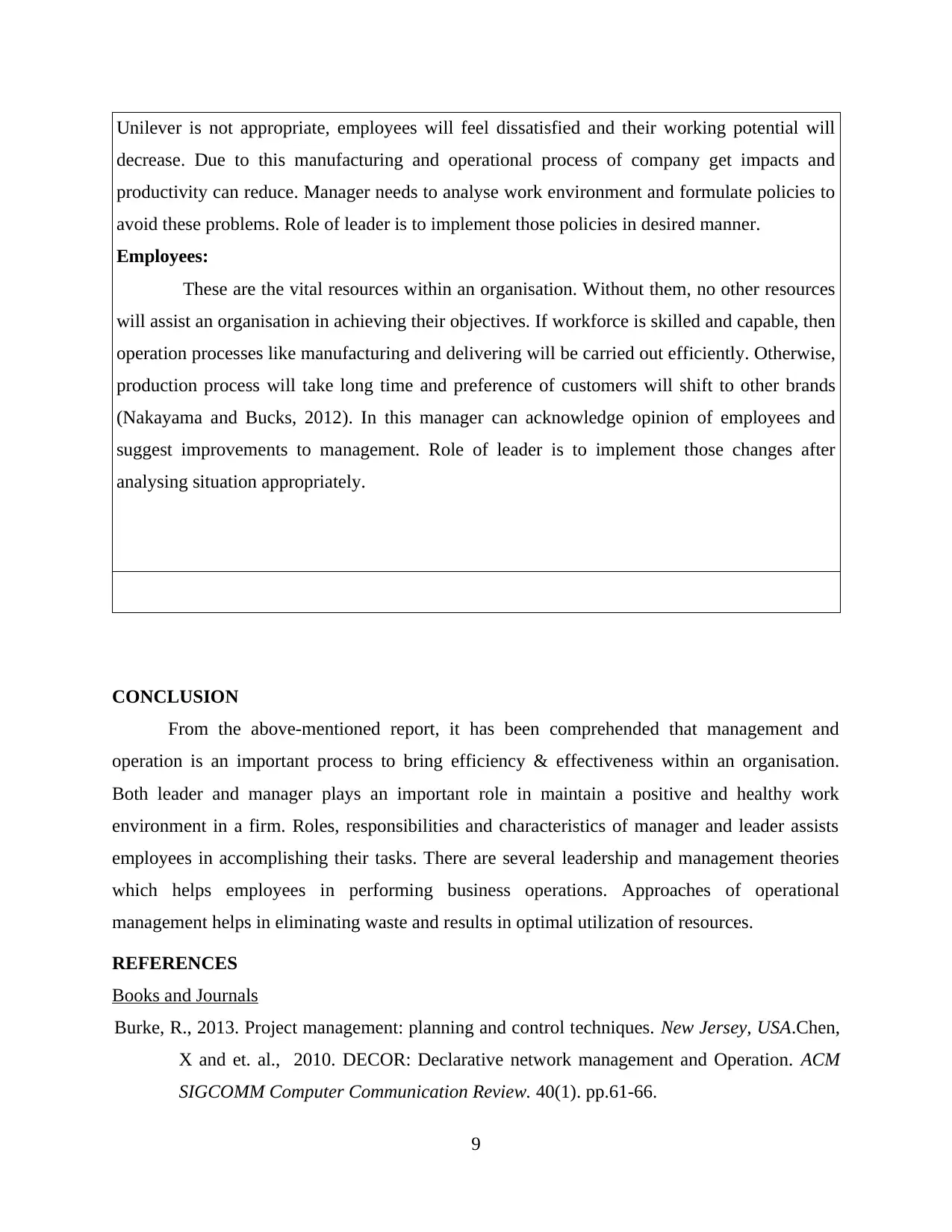
Unilever is not appropriate, employees will feel dissatisfied and their working potential will
decrease. Due to this manufacturing and operational process of company get impacts and
productivity can reduce. Manager needs to analyse work environment and formulate policies to
avoid these problems. Role of leader is to implement those policies in desired manner.
Employees:
These are the vital resources within an organisation. Without them, no other resources
will assist an organisation in achieving their objectives. If workforce is skilled and capable, then
operation processes like manufacturing and delivering will be carried out efficiently. Otherwise,
production process will take long time and preference of customers will shift to other brands
(Nakayama and Bucks, 2012). In this manager can acknowledge opinion of employees and
suggest improvements to management. Role of leader is to implement those changes after
analysing situation appropriately.
CONCLUSION
From the above-mentioned report, it has been comprehended that management and
operation is an important process to bring efficiency & effectiveness within an organisation.
Both leader and manager plays an important role in maintain a positive and healthy work
environment in a firm. Roles, responsibilities and characteristics of manager and leader assists
employees in accomplishing their tasks. There are several leadership and management theories
which helps employees in performing business operations. Approaches of operational
management helps in eliminating waste and results in optimal utilization of resources.
REFERENCES
Books and Journals
Burke, R., 2013. Project management: planning and control techniques. New Jersey, USA.Chen,
X and et. al., 2010. DECOR: Declarative network management and Operation. ACM
SIGCOMM Computer Communication Review. 40(1). pp.61-66.
9
decrease. Due to this manufacturing and operational process of company get impacts and
productivity can reduce. Manager needs to analyse work environment and formulate policies to
avoid these problems. Role of leader is to implement those policies in desired manner.
Employees:
These are the vital resources within an organisation. Without them, no other resources
will assist an organisation in achieving their objectives. If workforce is skilled and capable, then
operation processes like manufacturing and delivering will be carried out efficiently. Otherwise,
production process will take long time and preference of customers will shift to other brands
(Nakayama and Bucks, 2012). In this manager can acknowledge opinion of employees and
suggest improvements to management. Role of leader is to implement those changes after
analysing situation appropriately.
CONCLUSION
From the above-mentioned report, it has been comprehended that management and
operation is an important process to bring efficiency & effectiveness within an organisation.
Both leader and manager plays an important role in maintain a positive and healthy work
environment in a firm. Roles, responsibilities and characteristics of manager and leader assists
employees in accomplishing their tasks. There are several leadership and management theories
which helps employees in performing business operations. Approaches of operational
management helps in eliminating waste and results in optimal utilization of resources.
REFERENCES
Books and Journals
Burke, R., 2013. Project management: planning and control techniques. New Jersey, USA.Chen,
X and et. al., 2010. DECOR: Declarative network management and Operation. ACM
SIGCOMM Computer Communication Review. 40(1). pp.61-66.
9
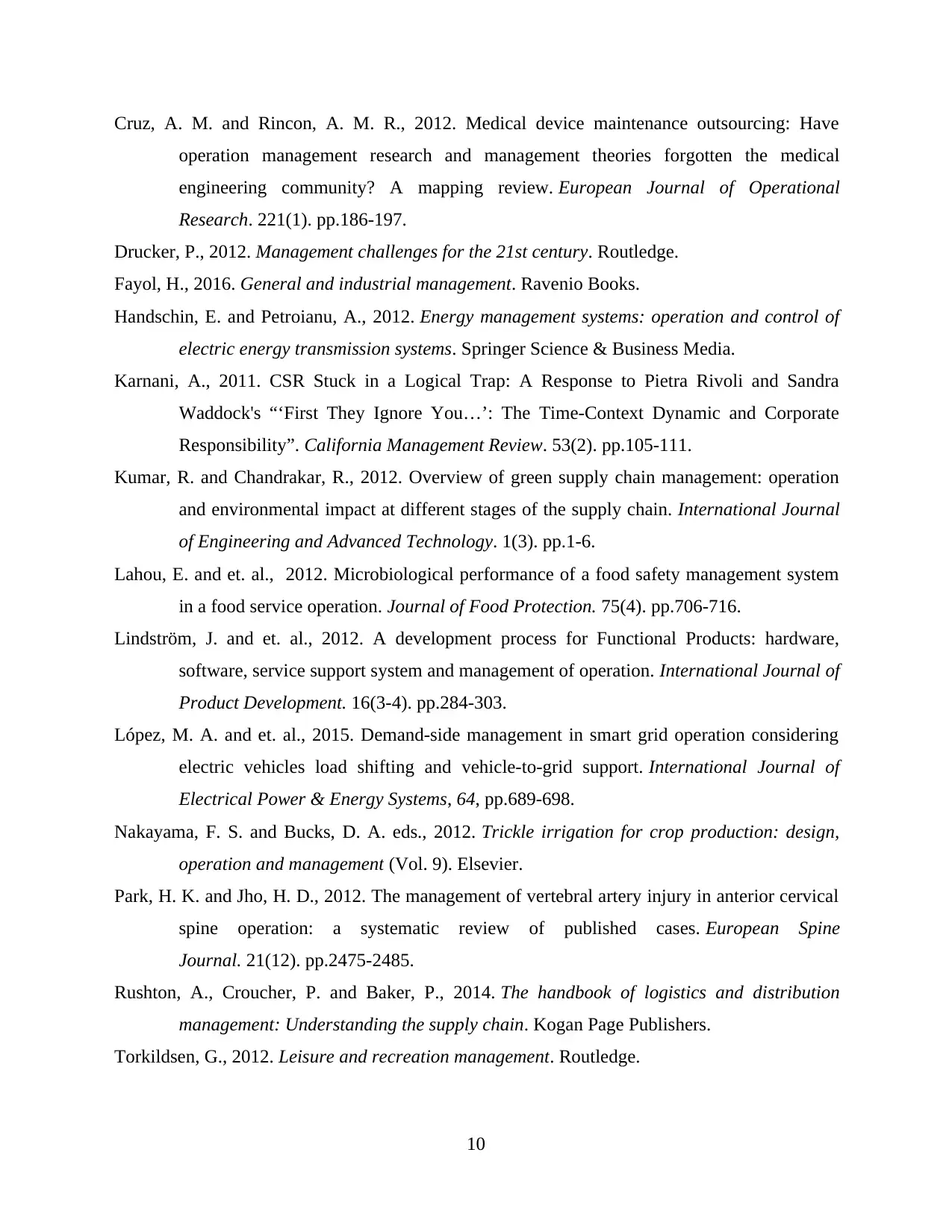
Cruz, A. M. and Rincon, A. M. R., 2012. Medical device maintenance outsourcing: Have
operation management research and management theories forgotten the medical
engineering community? A mapping review. European Journal of Operational
Research. 221(1). pp.186-197.
Drucker, P., 2012. Management challenges for the 21st century. Routledge.
Fayol, H., 2016. General and industrial management. Ravenio Books.
Handschin, E. and Petroianu, A., 2012. Energy management systems: operation and control of
electric energy transmission systems. Springer Science & Business Media.
Karnani, A., 2011. CSR Stuck in a Logical Trap: A Response to Pietra Rivoli and Sandra
Waddock's “‘First They Ignore You…’: The Time-Context Dynamic and Corporate
Responsibility”. California Management Review. 53(2). pp.105-111.
Kumar, R. and Chandrakar, R., 2012. Overview of green supply chain management: operation
and environmental impact at different stages of the supply chain. International Journal
of Engineering and Advanced Technology. 1(3). pp.1-6.
Lahou, E. and et. al., 2012. Microbiological performance of a food safety management system
in a food service operation. Journal of Food Protection. 75(4). pp.706-716.
Lindström, J. and et. al., 2012. A development process for Functional Products: hardware,
software, service support system and management of operation. International Journal of
Product Development. 16(3-4). pp.284-303.
López, M. A. and et. al., 2015. Demand-side management in smart grid operation considering
electric vehicles load shifting and vehicle-to-grid support. International Journal of
Electrical Power & Energy Systems, 64, pp.689-698.
Nakayama, F. S. and Bucks, D. A. eds., 2012. Trickle irrigation for crop production: design,
operation and management (Vol. 9). Elsevier.
Park, H. K. and Jho, H. D., 2012. The management of vertebral artery injury in anterior cervical
spine operation: a systematic review of published cases. European Spine
Journal. 21(12). pp.2475-2485.
Rushton, A., Croucher, P. and Baker, P., 2014. The handbook of logistics and distribution
management: Understanding the supply chain. Kogan Page Publishers.
Torkildsen, G., 2012. Leisure and recreation management. Routledge.
10
operation management research and management theories forgotten the medical
engineering community? A mapping review. European Journal of Operational
Research. 221(1). pp.186-197.
Drucker, P., 2012. Management challenges for the 21st century. Routledge.
Fayol, H., 2016. General and industrial management. Ravenio Books.
Handschin, E. and Petroianu, A., 2012. Energy management systems: operation and control of
electric energy transmission systems. Springer Science & Business Media.
Karnani, A., 2011. CSR Stuck in a Logical Trap: A Response to Pietra Rivoli and Sandra
Waddock's “‘First They Ignore You…’: The Time-Context Dynamic and Corporate
Responsibility”. California Management Review. 53(2). pp.105-111.
Kumar, R. and Chandrakar, R., 2012. Overview of green supply chain management: operation
and environmental impact at different stages of the supply chain. International Journal
of Engineering and Advanced Technology. 1(3). pp.1-6.
Lahou, E. and et. al., 2012. Microbiological performance of a food safety management system
in a food service operation. Journal of Food Protection. 75(4). pp.706-716.
Lindström, J. and et. al., 2012. A development process for Functional Products: hardware,
software, service support system and management of operation. International Journal of
Product Development. 16(3-4). pp.284-303.
López, M. A. and et. al., 2015. Demand-side management in smart grid operation considering
electric vehicles load shifting and vehicle-to-grid support. International Journal of
Electrical Power & Energy Systems, 64, pp.689-698.
Nakayama, F. S. and Bucks, D. A. eds., 2012. Trickle irrigation for crop production: design,
operation and management (Vol. 9). Elsevier.
Park, H. K. and Jho, H. D., 2012. The management of vertebral artery injury in anterior cervical
spine operation: a systematic review of published cases. European Spine
Journal. 21(12). pp.2475-2485.
Rushton, A., Croucher, P. and Baker, P., 2014. The handbook of logistics and distribution
management: Understanding the supply chain. Kogan Page Publishers.
Torkildsen, G., 2012. Leisure and recreation management. Routledge.
10
⊘ This is a preview!⊘
Do you want full access?
Subscribe today to unlock all pages.

Trusted by 1+ million students worldwide
1 out of 13
Related Documents
Your All-in-One AI-Powered Toolkit for Academic Success.
+13062052269
info@desklib.com
Available 24*7 on WhatsApp / Email
![[object Object]](/_next/static/media/star-bottom.7253800d.svg)
Unlock your academic potential
Copyright © 2020–2026 A2Z Services. All Rights Reserved. Developed and managed by ZUCOL.





